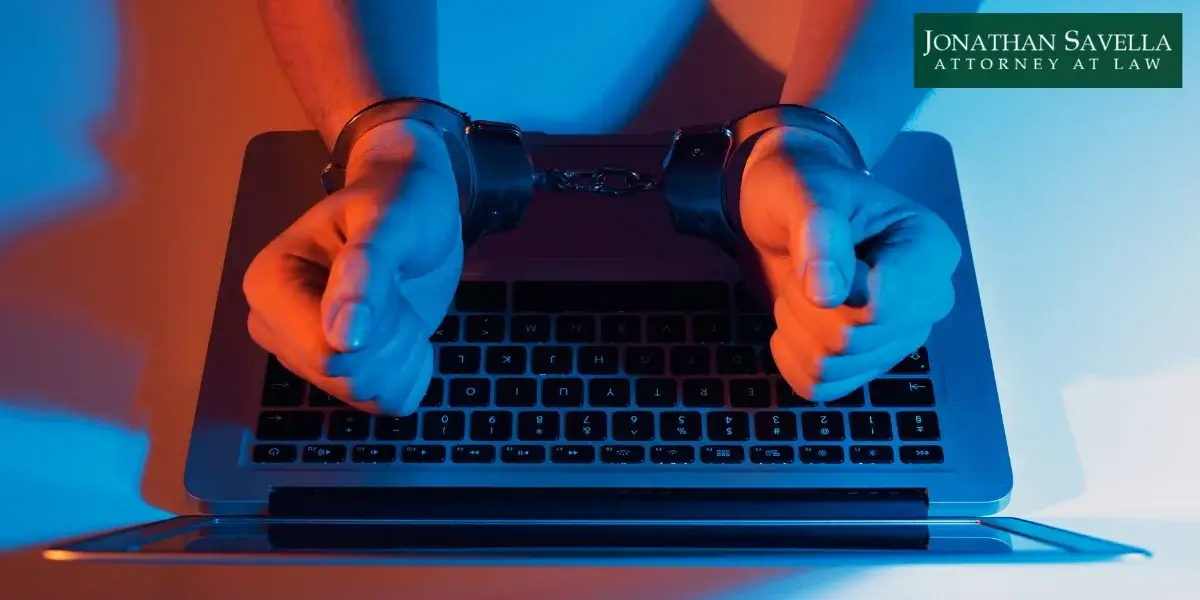Brooklyn Cyber Crime Lawyer
Brooklyn Cyber Crime Attorney
Cyber crime is a serious offense and can lead to jail time, hefty fines, and a criminal record. If you’re facing cyber crime charges, an experienced Brooklyn cyber crime lawyer at The Law Office of Jonathan Savella can give you the highest chance at a successful outcome in your case.

Cyber Crime Explained
Cyber crime refers to illegal acts that use a computer, which is considered any device that stores, retrieves, processes, or communicates information. The object of cyber crime is often financial gain but can also be related to stalking, abuse, harassment, drug trafficking, sex crimes, or terrorism. Devices that can be considered a computer include:
- Laptop and desktop PCs
- Cell phones
- Tablets
- Cryptocurrency
- Internet use
- Printers, hard drives, and other peripherals
Main Offenses in Cyber Crime
In New York, cyber crime laws focus on how the computer was used in the commission of a crime. There are five main offenses.
- Unauthorized Use of a ComputerThe unauthorized use of a computer charge means accessing or using a computer or network without permission. This applies when the person knows they are not allowed to access it, but it does not require there to be a notice. Activities may include identity theft, malware, stalking or cyberbullying, or disrupting government or business services.
- Computer TrespassComputer trespass also involves intentionally accessing a computer or network without authorization but is a more severe crime that specifically involves intent to commit a felony or access data. Examples include hacking into a bank’s database to steal customer information and cyber-attacks with malware to prevent a company from performing its normal business operations.
- Computer TamperingComputer tampering includes altering, damaging, or destroying a computer, network, or data. In New York, there are four degrees of computer tampering.
- Fourth degree. This is the least severe due to less harm done.
- Third-degree. This involves intent to commit a felony crime or more than $1000 damage.
- Second degree. This involves more than $3000 in damage or involving medical records.
- First degree. This involves more than $50,000 in damage.
- Duplication of Computer-Related MaterialsDuplication of computer-related materials means making digital copies of anything without authorization. For example, the duplication of copyrighted works such as music, books, or movies is illegal because copyright laws prohibit making copies without the copyright owner’s permission.
- Criminal Possession of Computer-Related MaterialsOwning a copy of illegally-duplicated materials is also illegal, even if the person did not copy the materials themselves. This means that just having a pirated copy of computer software, like Windows, is against the law. For this crime, there has to be intent to receive some benefit from the material, either for the person in possession or someone else who is not the owner of the original content. This may be as simple as accessing paid information or services without paying.
Penalties
Given the wide range of ways technology is used illegally, it may come as no surprise that there is also a wide range of charges associated with cyber crime in Brooklyn, NY. Depending on how the technology was used and what other crimes were committed with the tech, convictions could lead to misdemeanor, felony, or federal convictions, and penalties vary from one year in jail to fifteen years in jail. Some of the penalties are:
- Unauthorized use of a computer. Class A misdemeanor, up to one year in jail
- Computer trespass. Class E felony, up to four years in jail
- Fourth-degree computer tampering. Class A misdemeanor, up to one year in jail
- Third-degree computer tampering. Class E felony, up to four years in jail
- Second-degree computer tampering. Class D felony, up to seven years in jail
- First-degree computer tampering. Class C felony, up to fifteen years in jail
- Unlawful duplication. Class E felony, up to four years in jail
- Criminal possession. Class E felony, up to four years in jail
When the crime involves the internet, crosses state lines, or attacks a federal agency, the person can be charged with federal crimes and be sentenced to incarceration for up to twenty years, harsh fines, restitution, forfeiture of personal property, and probation.
FAQs
Q: What Are the Most Common Cyber Crimes?
A: The most common cyber crimes involve fraud, data breaches, identity theft, and malware, according to the Federal Bureau of Investigation’s Internet Crime Complaint Center (IC3). Fraud includes phishing, non-payment and non-delivery, and romantic and investment scams. Malware can mean pop-ups that steal information or infect your computer, or it can be a more sophisticated scam. Extortion and crimes that seek to exploit children are also on the rise.
Q: How Do I Report Cyber Crime in NY?
A: You can often report cyber crime in the same way you would report any crime by contacting your local law enforcement. In some cases, you may be able to report directly to a federal agency. If the crime involves the internet, you can contact IC3. If someone is using your social security number, you can notify the Social Security Administration. If it involves identity or financial crime, you can report it to the Federal Trade Commission.
Q: Could You Commit a Cyber Crime by Accident?
A: Yes, in some cases, you can commit a cyber crime by accident, especially at work. Examples include unintentionally changing or deleting financial or medical records, sending confidential emails with sensitive information to the wrong person, or using a personal device that is more susceptible to security risks. For many convictions, intent is a necessary component, but there is the potential for mistakes to have serious consequences.
Q: What Does a Cyber Crime Defense Lawyer Do?
A: A cyber crime defense lawyer provides legal counsel and representation to clients charged with crimes such as phishing, hacking, identity theft, malware, or other crimes related to computers and the internet. An attorney can develop a defense strategy that will protect their client’s rights and make sure they get fair treatment by law enforcement and court officials. Your defense lawyer’s goal is to make sure you get the most favorable outcome possible in your case.
Fight Cyber Crime Charges
You don’t have to face cyber crime charges alone. The legal team at The Law Office of Jonathan Savella has extensive experience in fiercely advocating for clients facing charges like cyber crimes. Contact our office today to schedule an initial consultation.



